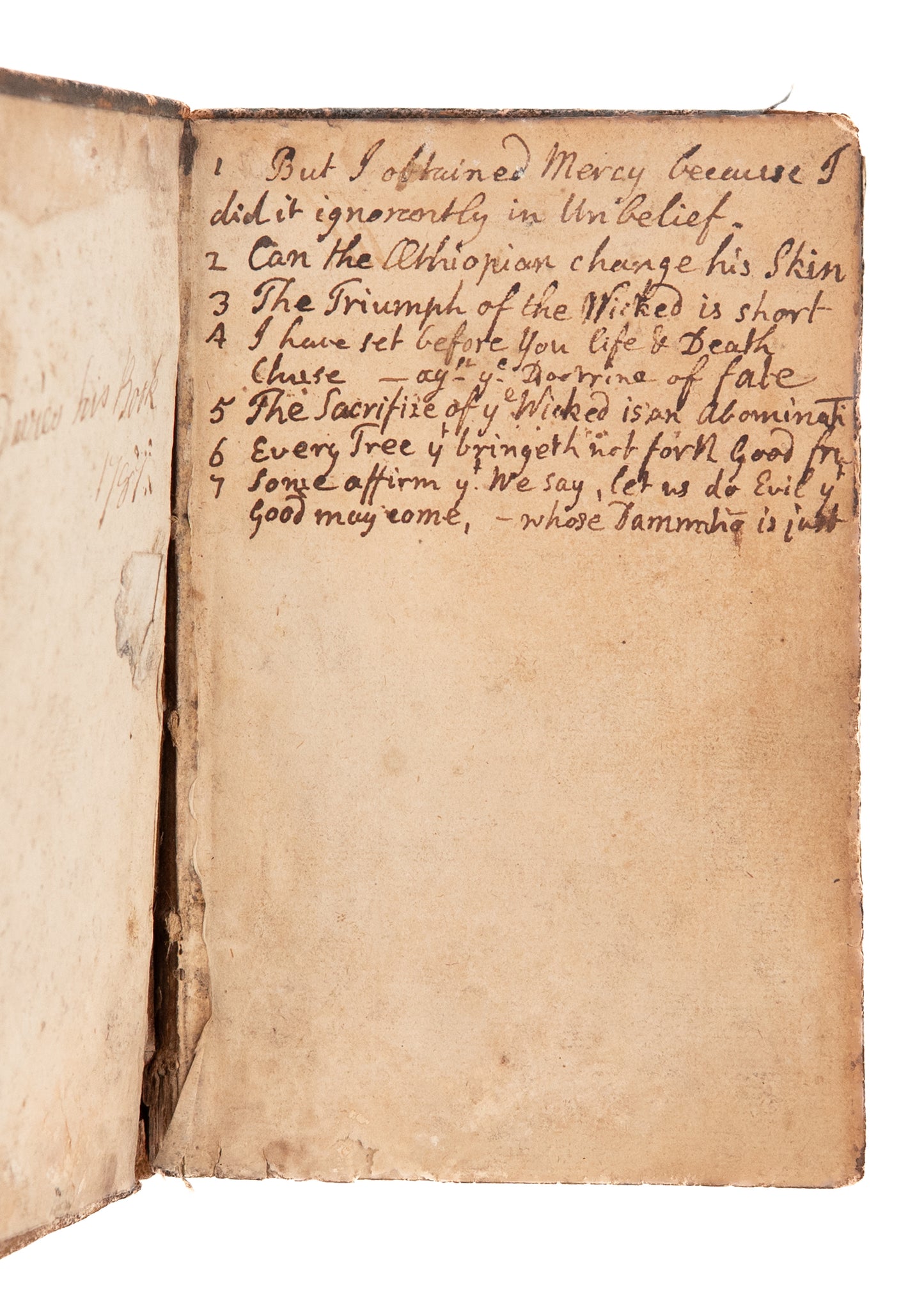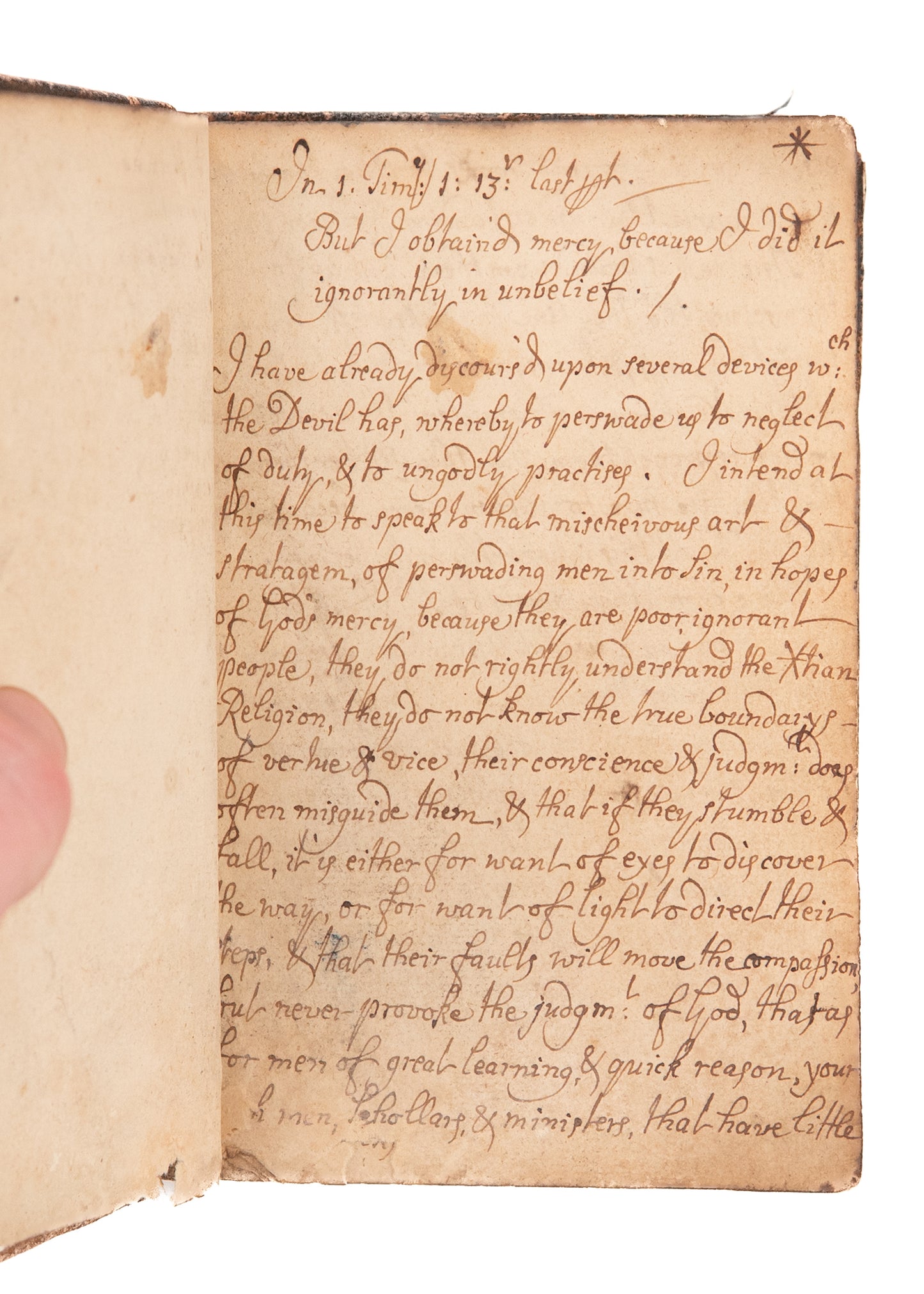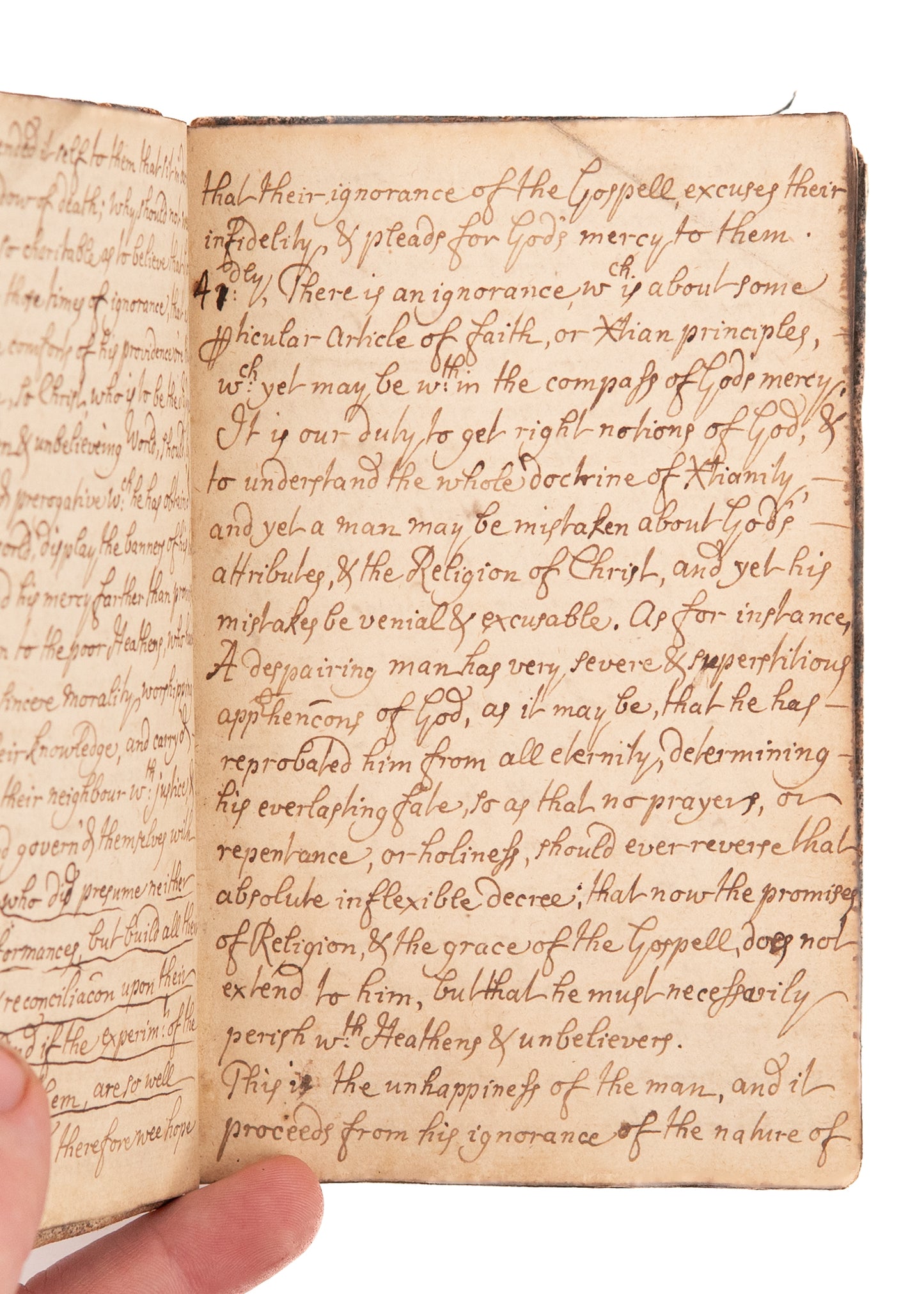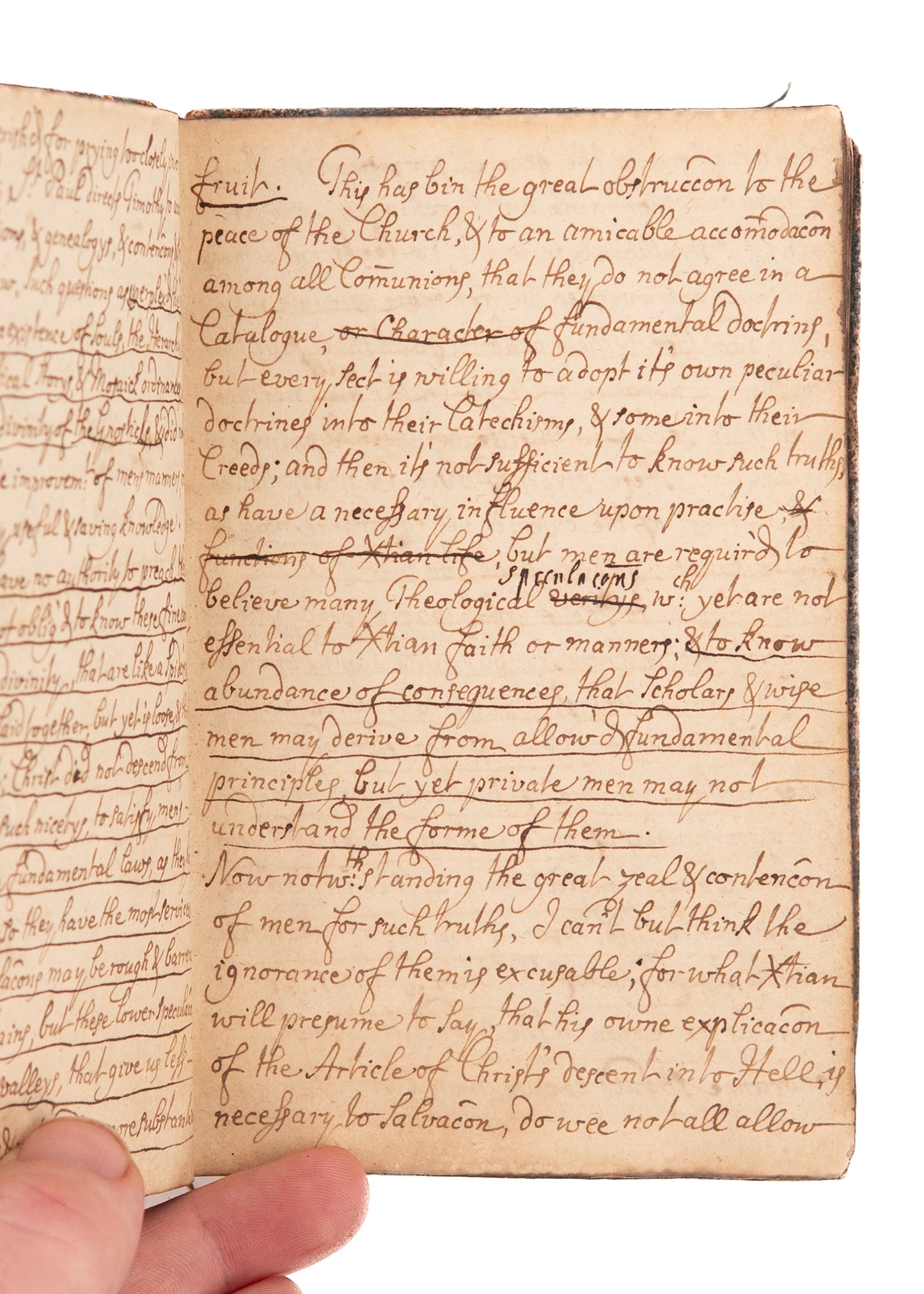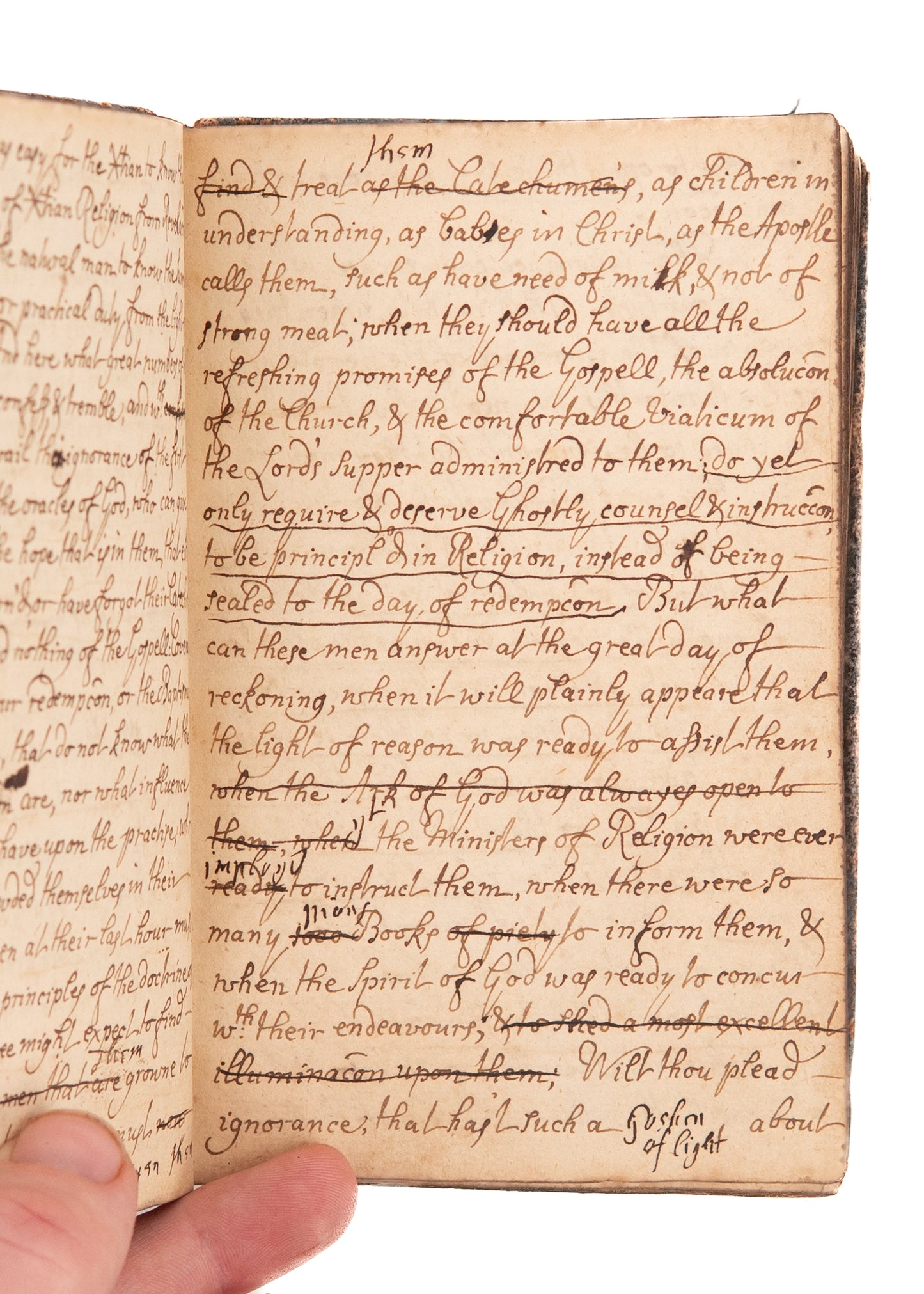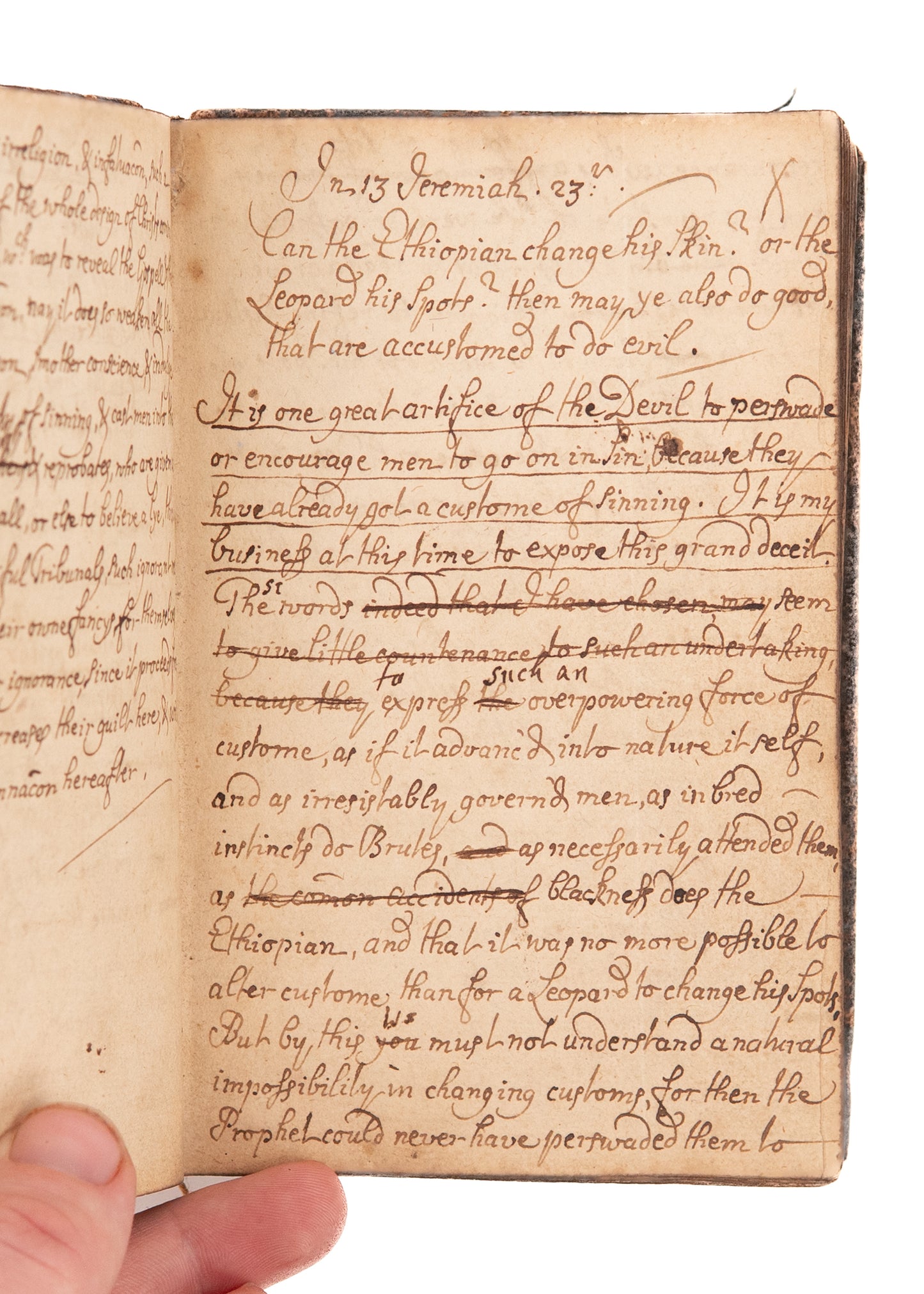Specs Fine Books
1787 WELSH GREAT AWAKENING. 266pp MSs Sermons on Devil's Devices - Great Awakening, Methodist, &c.
1787 WELSH GREAT AWAKENING. 266pp MSs Sermons on Devil's Devices - Great Awakening, Methodist, &c.
Couldn't load pickup availability
A very fine volume of lively, exceedingly well-crafted sermons on the "Devil's Devices" against God's people and against the souls of men. The only indication of authorship is the signature of J. Davie son the pastedown, likely Welsh. Well worth further research.
The author seems to be of that school that either had been, or remained Anglican, but who were deeply influenced by the Methodist and Calvinistic Methodist movements of John Wesley, George Whitefield, etc., the author's education is clear, but all brought under the mastery of delivering deeply spiritual and practical discourses. Well worth further research and we would think publication. There are some genuinely original and excellent passages.
42,500 words 266pp, dated to 1787.
Extracts:
I Timothy 1.13. But I obtained mercy because I did it ignorantly in unbelief . . .
An insightful and penetrating discourse aimed at those who hide under the cover of the inscrutability of the Gospel and a pretended inability as simple “lay persons,” to comprehend the ways of Christ, etc.,
I have already discours’d upon several devices which the Devil has, whereby to persuade us to neglect of duty, & to ungodly practices. I intend at this time to speak to that mischievous art & stratagem, of persuading men into sin, in hopes of God’s mercy, because they are poor, ignorant people; they do not rightly understand the Xtian Religion, they do not know the true boundaries of virtue & vice, their conscience & judgment does often misguide them & that if they stumble & fall, it is either for want of eyes to discover the way or for want of light to direct their steps & that their faults will move the compassion, but never provoke the judgment of God, they as for men of great learning & quick reason, your rich men, scholars, & ministers, that have little else to do but to read books, to study the Scriptures & to improve their understanding, Religion in all its strictness is bound upon them, but as for themselves, tho they live in wickedness, in unrighteousness, & transgress their duty to God, to their Neighbor, to themselves, their consciences do not reproach them, but they flatter themselves that they are sure to obtain mercy because they say they do all this ignorantly and in unbelief . . .
. . . There is an ignorance that does excuse sin. . . it frequently happens in men that are distracted, either by some defect in the brain, by the violence of disease, as lunaticks, or men in burning fevers & the like, that they imagine, speak & do things that are most absurd, contrary to common sense & customs, but also such as are against all reason, against the dictates of natural conscience, or the law of nature, such as are blasphemy against God, horrible Oaths & Curses, & the most spiteful malicious designs against men. Now all this proceeds from a disturbed fancy & distracted imagination (and we do not know how far God may permit the Devil to take advantage of it) but it’s most reasonable to believe that the Devil is then most ready to make these sad impressions upon the man, either to shew his own power, or to amuse the World and create suspicious, & unworthy apprehensions of God, permitting even good me to fall under such an unlucky occasion both to God & Man . . . and the Devil will be condemn’d & punish’d for that damnable enmity against God & that malicious spite against innocent souls, which plead for compassion . . .
. . . and why should we not believe so well of an infinite mercy, as diffuses itself over the whole creation, or to think that in every Nation, he that feareth God & worketh righteousness will be accepted with him. . . we are not to judge those that are without [Gospel knowledge], for those that are without God judgeth, and it’s very probable even from his own Revelation . . . God should by that unconfined prerogative which he has obtained over all the World, display the banners of his love over it & extend his mercy farther than promise obliges Him, even to the poor Heathens, who have here lived in all sincere morality, worshipping God according to their knowledge, and carried themselves towards their neighbor with justice & peace & charity, and governed themselves with sobriety & charity, who did presume neither upon all their performances, but build all their hopes of acceptance & reconciliation upon their expiatory sacrifices; and if the experiment of the Gospel were made upon them, are so well disposed to receive it. And therefore we hope that their ignorance of the Gospel excuses their infidelity & Pleads for God’s mercy to them . . .
. . . some men, when they have laid upon themselves such an uncommanded and unnecessary task [as comprehending God in all detail and perfection] have either run themselves into despair & madness like the Philosopher that threw himself into the sea because he could not comprehend the flux & reflux of it, or else have been tempted to believe that Religion is nothing but an infinite maze of disputable opinions about which men forever quarrel, but can never lead themselves out of these intricacies & perplexities, &c. . .
. . . Such questions as perplexed the Gnostics about the pre-existence of souls, the hierarchy of angels, poetical stories, & Mosaic ordinances . . . did not attend to the improvement of men’s manners or for the advance of any useful & saving knowledge. Now if we have no authority to preach them, the people are not obliged to know these fine curious speculations in divinity, that are like a spider’s web, most artificially laid together, but yet is loose & thin and yields no profit. Christ did not descend from heaven to resolve such niceties, to satisfy men’s impertinences; the fundamental laws, as they have the surest evidence, so they have the most serviceable use. Their highest speculations may be rough & barren like the high mountains, but these lower-speculations are like the humble valleys, that give us less trouble to cultivate & yet yield a more substantial fruit. . . This has been a great obstruction to the peace of the Church, to an amicable accommodation among all Communions, [not] that they do not agree in a Catalogue of Fundamental doctrines, but [that] every sect is willing to adopt its own peculiar doctrines into their Catechisms & some into their Creeds, and then it is not sufficient to know such truths . . . but men are required to believe many theological speculations which yet are not essential to the Christian faith or manners . . .
. . . they have indulged Schism & Heresy, which depend more upon the understanding of men, the capacity & abilities of which are not so readily to be known, and therefore the want of light, or the weakness of the judgment, should exempt men from civil penalties, yet these have been always punished as proceeding from the viciousness of the affections & not from the insufficiency or incompetency of understanding . . .
Jeremiah 13.23. Can the Ethiopian change his skin? Or the leopard his spots? Then may ye also do good, that are accustomed to evil.
It is one great artifice of the Devil to persuade or encourage men to go on in sin, because they have already got accustomed to sinning. It is my business at this time to expose this grand deceit.
. . . some sins there are, it’s true, that flatter the sensitive appetite, fit themselves to particular constitutions & complexions, have such advantages over us from the especial circumstances of our life. I can’t say but that our appetites do in the present state of affairs betray us to such sensual vices, such as the excesses about meals & drinks, wantonness & fornication & covetousness & immoderate love of the world, revenge & anger or the like . . .
. . . sin is far from any pretense to natural right or original possession; the instincts & inclinations of nature, even in this degenerate state, are plainly against it. Nay, in the case of lust itself, where nature is aptest to be most rude, tumultuous, & insulting, there is a natural modesty & fear of shame & discovery that restrains the sallies of lust, guards the virtue even of boiling youth & diverts ye ill-consequences of adultery, which would be otherwise more injurious and insurmountable to the world . . . Nay, the habits of lust itself are not so deeply fixed but the holy discipline of fasting & abstinence, will dispossess the strong man & reduce the rebellious appetite into its due obedience to reason . . . we do not find that habits are invincible upon account of nature . . .
. . . no customs or habits of sinning can be too strong for the grace of God to overcome & expel . . . the grace of God breaks in upon the soul, like the sun beams upon the eye, and all of a sudden spreads the bright influence of light & knowledge over all their understanding; and so when custom had chained us up to the most sordid vices, and irreligious practices, presently the grace of God appears & subdues their habits & transforms their minds & overpowers their natures. Nay, such is the power of religion, that the Primitive Fathers would undertake by its influence to reform the most inveterate vices of men . . . As Lactantius, “Give me the most covetous, selfish, narrow Spirit & I will enlarge his soul and [by the Spirit] will give chastity to the wanton, courage to the coward, justice to the extortioner & cheat. Thus the voice of thunder breaks the cedars & shaketh the wilderness, and the most inveterate diseases cannot stand before his word of healing. He can restore the obstinate sinner, take the scales form his eyes & hardness from his heart, conquer the diseases of his soul & reduce he most deviant habits to soundness of mind & sobriety of life. Nay, when he call’d forth Lazarus from the grave, after he had been dead 4 days, that is, when all vital operations had been long since ceased, and the humours of the body too must have ceased their revolution, yet even then his miraculous power could restore him to life & activity; so this grace of the Gospel can raise men that are dead in trespasses & sins, after the longest interruptions, or an utter cessation of spiritual life, put all their faculties into motion again & fix them in all the exercises of a divine life. As Paul saith, You hat he quickened, who were dead in trespasses & sins. What can’t the power of God & the efficacy of the divine grace effect, all the habits of men, tho they look so terrible to our natural powers, yet they can’t stand before the divine grace When once this supernatural power exerts itself, then tho the builders of Babel had improved their language & speech, yet God can with the word of his mouth set aside their intellectual habits, confound their knowledge, & like a stupefying apoplexy, lay them asleep in ignorance and forgetfulness. But then, when his power is pleased to exert itself in a more gracious manner, then he can graft all the characters of learning upon the untaught understanding, open all the mystery of languages, & without any previous study, infuse the habits of divine knowledge, as He did upon the Apostles on the day of Pentecost . . . to be sure, God never denies the sincere Christian so much of his grace, as is necessary for him in this humble state, to support him amidst all the temptations & difficulty & dangers of it . . .this grace is the purchase of Christ’s blood and his intercession still pleads for it.
Matthew 3.10. Every tree that bringeth not forth good fruit, is hewn down & cast into the fire.
. . . what honour does he give to God whose Religion consists in negatives; he is no extortioner, no unjust man, no adulterer, but where is the merit & beauty of all this, the insensible world might say the same, that they do not transgress the rules of creation, but they further too observe God’s dictates, which are their own instincts too. But shall a man be said to glorify God when the great perfections of God exact no sensible demonstration of his love, nor all his commands meet with actual obedience. A mere abstinence from sin neither resembles us to God, nor engages man in the holiness and goodness and purity of God; it gives no public testimony of conformity to God. This religion that consists in bare abstinence from sin does not serve that end of religion which promotes that happiness of human nature. Nature can never be happy while it is like a standing dead pool, where all the springs of action are choked, & the faculties cannot move . . . we cannot suppose that we live as Christians, or indeed, even reasonable men, if we abstain only from the vices of animal nature. Religion corrects our sensitive appetites, restraining us from all debauchery & intemperance & fleshly lusts, but still this is only a small part of religion . . . [True], it is better for a man to be like a standing pool, where all his faculties stand & stagnate in a perpetual rest, than to be like a torrent altogether rapid & disturbed, but yet the middle state is desirable, where all the actions of Christian life are performed pleasantly & sweetly and the man is not hurried away by violent passion on the one hand, nor confined to a state of sloth on the other. Then is the man employed as God would have him.
. . . a [mere] submission to violence & oppression & a quietness under injury may provoke new ones. It may exasperate old adversaries & provoke new enemies. But when attended also with kindness & prayers and charitable offices, then it looks not like the submission of an ass, but like the meekness of a Christian; a poor narrow temper may discourage a man from revenge or returning injury, but it will seldom tempt a man to return blessing for cursing or to overcome evil with good. And there is no part of Religion that consists in mere abstinence from evil that will do much kindness to the world . . .
A good + copy, bound in leather, lightly shaken, with light foxing.
Share

